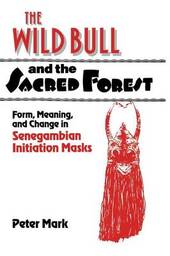
|
The Wild Bull and the Sacred Forest: Form, Meaning, and Change in Senegambian Initiation Masks
Hardback
Main Details
| Title |
The Wild Bull and the Sacred Forest: Form, Meaning, and Change in Senegambian Initiation Masks
|
| Authors and Contributors |
By (author) Peter Mark
|
| Series | Res Monographs in Anthropology and Aesthetics |
|---|
| Physical Properties |
| Format:Hardback | | Pages:190 | | Dimensions(mm): Height 264,Width 188 |
|
| Category/Genre | Art of indigenous peoples |
|---|
| ISBN/Barcode |
9780521413466
|
| Classifications | Dewey:709.6 |
|---|
| Audience | | Professional & Vocational | |
|---|
|
Publishing Details |
| Publisher |
Cambridge University Press
|
| Imprint |
Cambridge University Press
|
| Publication Date |
28 February 1992 |
| Publication Country |
United Kingdom
|
Description
The study of the cattle-horned initiation masks of southern Senegal and the Gambia innovatively weaves together art history, history, and cultural anthropology to give a detailed view of Casamance cultures, as they have interacted and changed over the past two centuries. Based on seven field trips to West Africa and fifteen years of research in colonial archives and in museum collections from Dakar to Leipzig, Professor Mark's work presents a subtle interpretation of Casamance horned masquerades, their complex ritual symbolism, and the metaphysical concepts to which they allude. (The masks protect against the power of the kussay, or "sorcerers".) In tracing the cultural interaction and changing identity of the peoples of the Casamance, the author convincingly argues for a new and dynamic approach to art and ethnic identity. Culture should be seen, not as a fixed entity, but as a continuing process. This dynamic model reflects the long history of interaction between Manding and Diola and between Muslim and non-Muslim, a process that has resulted in the creation of hybrid masking forms.
Reviews"Clearly, Mark has provided great service in preserving for the ethnographic record documentation on masks that are apparently rapidly deteriorating. These masks have also provided Mark with a wonderful vehicle for the publication of valuable materials on the history of the Casamance. As a scholar of the Basse-Casamance, I found the detailed and extensive discussion of the region's history extremely well informed and engaging." Museum Anthropology "Peter Mark provides us with an excellent study into the meaning and evolution of horned masking among the Jola and other groups of the Casamance region of West Africa...there is much to be valued in Mark's study of Ejumba masking...His book is an impressive volume for which Mark deserves high praise." African Studies Review "Peter Mark's excellent study of the initiation masks and rituals of the Jola people in the Casamance region of Senegal has made a major contribution to the fields of art history and religion...Besides its interdisciplinary approach, Mark's study is innovative in a number of ways...This book is highly recommended to advanced undergraduates, graduate students, and scholars of religion and art history, as well as to Africanists in any disipline." Journal of the American Academy of Religion "Mark has done a masterful job of tracking down over sixty such masks on three continents, unraveling the often complex history of particular masks, and supplementing them with his thorough knowledge of early European travellers' accounts which provide, occasionally with illustrations, the earliest evidence of such masks among the Diola. He skillfully interprets the changing iconography of the masks, relating them to Diola thought about manhood, fertility, witchcraft, and clairvoyance as well as the openness of Diola maskmakers to incorporate Muslim gris-gris (or shapes that imitate such talismen), Manjaco cloth, and even such commercial items as cowry shells and buttons into the decoration of the masks." Robert M. Baum, Journal of Religion in Africa
|